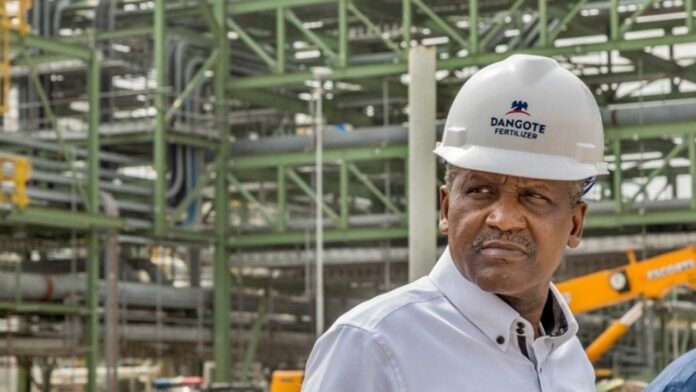IOCs still causing crude supply crisis, Dangote refinery cries out
CHIGOZIE AMADI
The Management of Dangote Industries Limited has insisted that the international oil companies are still frustrating crude supply to its 650,000-capacity refinery.
The management said this even as it commended the Nigerian Upstream Petroleum Regulatory Commission for its various interventions in the oil company’s crude supply requests from IOCs, and for publishing the Domestic Crude Supply Obligation guidelines to enshrine transparency in the oil industry.
In a statement on Wednesday, the Dangote Group alleged that the IOCs insisted on selling crude oil to its refinery through their foreign agents, saying the local price of crude would continue to increase because the trading arms offer cargoes at $2 to $4 per barrel, above NUPRC official price.
The group also alleged that the foreign oil producers seemed to be prioritising Asian countries in selling the crude they produced in Nigeria.
The Vice President, Oil & Gas, Dangote Industries Limited, Mr DVG Edwin, said, “If the Domestic Crude Supply Obligation guidelines are diligently implemented, this will ensure that we deal directly with the companies producing the crude oil in Nigeria as stipulated by the Petroleum Industry Act.”
Edwin insisted that IOCs operating in Nigeria had consistently frustrated the company’s requests for locally-produced crude as feedstock for its refining process.
IOCs trading arms
He stated that when cargoes were offered to the oil company by the trading arms, it was sometimes at a $2 to $4 (per barrel) premium above the official price set by the NUPRC.
“As an example, we paid $96.23 per barrel for a cargo of Bonga crude grade in April (excluding transport). The price consisted of a $90.15 dated Brent price plus a $5.08 NNPC premium plus a $1 trader premium. In the same month, we were able to buy WTI at a dated Brent price of $90.15 + $0.93 trader premium including transport. When the Nigerian National Petroleum Company Limited subsequently lowered its premium based on market feedback that it was too high, some traders then started asking us for a premium of up to $4m over and above the NSP for a cargo of Bonny Light.
“Data on platforms like Platts and Argus shows that the price offered to us is way higher than the market prices tracked by these platforms. We recently had to escalate this to NUPRC,” Edwin said, urging the commission to take a second look at the issue of pricing.
Edwin was reacting to a statement by the Chief Executive of the NUPRC, Gbenga Komolafe, who in an interview on national television said, “It is ‘erroneous’ for one to say that the International Oil Companies are refusing to make crude oil available to domestic refiners, as the Petroleum Industry Act has a stipulation that calls for a willing-buyer, willing-seller relationship.”
While noting that the commission had been very supportive of the Dangote refinery as it had intervened several times to help secure crude supply, Edwin, however, insisted that the NUPRC boss might have been misquoted by some people hence his statement that IOCs did not refuse to sell to us.
“To set the records straight, we would like to recap the facts below. Aside from the NNPCL, to date, we have only purchased crude directly from only one local producer, Sapetro. All other producers refer us to their international trading arms. These international trading arms are non-value-adding middlemen who sit abroad and earn a margin from crude being produced and consumed in Nigeria. They are not bound by Nigerian laws and do not pay taxes in Nigeria on the unjustifiable margin they earn.
“The trading arm of one of the IOCs refused to sell to us directly and asked us to find a middleman who would buy from them and then sell to us at a margin. We dialogued with them for nine months and in the end, we had to escalate to NUPRC who helped resolve the situation,” Edwin stated.
He spoke further, “When we entered the market to purchase our crude requirement for August, the international trading arms told us that they had entered their Nigerian cargoes into a Pertamina (the Indonesia National Oil Company) tender, and we had to wait for the tender to conclude to see what is still available. This is not the first time. In many cases, particular crude grades we wish to buy are sold to Indian or other Asian refiners even before the cargoes are formally allocated in the curtailment meeting chaired by NUPRC.”
He urged the NUPRC to take a second look at the issue of pricing, having severally asserted that transactions should be on a willing-seller, willing-buyer basis.
For this to work, he said that there must be market liquidity (many sellers/many buyers in the market at the same time) unlike where a refinery needs a particular crude grade loading at a particular time then there is typically only one participant on either side of the market.
“It is to avoid the problem of price gouging in an illiquid market that the domestic gas supply obligation specifies volume obligation per producer and a formula for transparently determining pricing. The fact that the domestic crude supply obligation as defined in the PIA has gaps is no reason for wisdom not to prevail,” Edwin stated.
The PUNCH reported earlier that the President of the Dangote Group, Alhaji Aliko Dangote, told editors during a tour of the refinery that the refinery was set to roll out its petrol in August 2024, having resolved its crude oil supply issues through the help of the Nigeria National Petroleum Company Limited and the Federal Government.
Dangote’s comment came a few days after the NUPRC said crude oil producers in Nigeria had committed to working towards a sustainable supply of crude oil to Dangote and other local refineries under a market-determined pricing system.
Both parties had said the commitment aimed to ensure that while the operators (crude oil producers) do business optimally, the refineries are not starved of feedstock.
Accordingly, the industry regulator, the Nigeria Upstream Petroleum Regulatory Commission has directed oil refiners to provide monthly price quotes on crude supply.
Refiners accuse IOCs
Meanwhile, the Crude Oil Refiners Association of Nigeria has also alleged that IOCs in the country have been selling crude to CORAN members through their trading agents in Europe instead of engaging in direct sales to local refineries.
CORAN, while expressing optimism that the recent intervention of the Federal Government would help in stopping the practice, described it as an illegal act that requires immediate government attention.
In an interview, CORAN Publicity Secretary, Eche Idoko, told The PUNCH that the oil companies engaged in the act despite the regulations of the Nigerian Upstream Petroleum Regulatory Commission on the Domestic Crude Supply Obligation.
“To be fair to the Federal Government, the NUPRC has set up the Domestic Crude Supply Obligation that is meant to mandate the crude producers to supply to the Nigerian market.
“But as I speak to you, the IOCs are still kicking to see how they can whittle down the effect of the DCSO guideline, which said they should sell crude to Nigeria on a willing-buyer, willing-seller basis, but under a favourable term to Nigerians.
“What the IOCs are pushing for is that the agreement is signed between the refineries and their trading agencies instead of themselves, but the Petroleum Industry Act says it should be with them. Why they want us to sign with their trading agencies or partners is that most of their trading agencies are in Europe,” Idoko stated.
The oil refiners’ spokesperson added, “So, it means we are buying crude from a European country while the producer is in Nigeria. This is the same thing the Dangote refinery was complaining about. We will be buying our crude oil like it is from an international market. Those are the issues we’ve been grappling with.”
Idoko added that the IOCs want to be paid through the A-rated banks, meaning the cost could only be paid in dollars.
“Another issue is that the IOCs want us to pay with an A-rated bank and no Nigerian bank is A-rated, so we have to buy with dollars. The clauses they are trying to smuggle into this trade agreement will make it more difficult for us to buy from them under a domestic trade term. This technically places us at a disadvantage,” he said.
NUPRC recently announced that it had resolved the controversies between oil producers and local refineries, a development that was re-echoed by the Dangote Petroleum Refinery at the time it said the plant would release petrol to the market in August.
However, CORAN called for concerted efforts to prevent a situation whereby the Dangote refinery would resort to the importation of its crude due to an unfavourable Nigerian market.
Idoko told our correspondent that Dangote and other local refiners were in the oil business to ameliorate the sufferings of Nigerians, especially in having access to cheaper fuel and ending years of recurring fuel scarcity.
“Most refiners in Nigeria went into the business out of passion. We really want to see the sufferings of Nigerians ameliorated. But what I can say is that Dangote will definitely sell his product to make profits. He has done a lot to have sighted the refinery in Nigeria.
“The Federal Government also has to do the needful to ensure he also gets the crude at a cheap rate. If the crude is not sold to him cheaper, we will not get the anticipated price reduction the refinery should bring to PMS. But it will be less cumbersome for the Federal Government to buy from him,” Idoko stated.
CORAN expressed concern that the Federal Government was finding it difficult to enforce its regulations, saying the IOCs want to retain Africa as their market for imported petroleum products.
“If local refineries sell their products outside Nigeria, it will bring an inflow of foreign exchange and it will reduce the pressure on the naira. But our question is, why is it so difficult for the Nigerian government to see through the gimmicks of these oil merchants who continue to hold us to ransom? They want to guarantee supply to their refineries outside Nigeria.
“If Nigerian refineries continue to get crude supply, it means they can only get crude after the Nigerian refineries are satisfied; they might go out of market. The second reason is that they want a continuous market in Africa for their products, and Nigeria is the largest consumer of refined products in Africa. The Nigerian government should wake up.
“The refining industry in Nigeria has the propensity to create 20 million direct and indirect jobs. It can solve 60 per cent of the current forex issue with a direct impact on inflation. We have been pleading with the Coordinating Minister of the Economy to sit with us to see how we can partner together, but the trade merchants have presented themselves as the saviour and we as the enemy,” he claimed.
Idoko charged the Federal Government to implement its policies and guarantee the supply of crude to local refineries.
Meanwhile, repeated efforts to speak with the IOCs individually and as a group proved abortive. While some of them acknowledged the emails sent to them by our correspondent seeking their reactions to the various allegations against them, they refused to comment.
IOCs keep mum
An official of the Oil Producers Trade Section, a sub-group within the Lagos Chamber of Commerce and Industry, promised to revert but he has yet to provide a detailed response up till when this report was filed.
Rather the official, who did not want his name in print, said many of the allegations were not true.
Contacted, the NUPRC spokesperson, Olaide Shonola, said the commission was not aware of claims that the IOCs sold crude to local refiners through their foreign trading agents, promising to find out.
Our correspondent recalls that Dangote’s Edwin had last week accused international oil companies in the country of plotting to frustrate the survival of the $20bn refinery.
He said the IOCs were deliberately and willfully frustrating the refinery’s efforts to buy local crude by hiking the cost above the market price by $6, thereby forcing the refinery to import crude from countries as far as the US, with its attendant high costs.
Edwin stated, “The IOCs are deliberately and willfully frustrating our efforts to buy the local crude.
“It seems that the IOCs’ objective is to ensure that our petroleum refinery fails. It is either they are deliberately asking for a ridiculous and humongous premium or they simply state that crude is not available.
“At some point, we paid $6 over and above the market price. This has forced us to reduce our output as well as import crude from countries as far as the US, increasing our cost of production.
“It appears that the objective of the IOCs is to ensure that Nigeria remains a country, which exports crude oil and imports refined petroleum products. They are keen on exporting the raw materials to their home countries, creating employment and wealth for their countries, adding to their Gross Domestic Product (GDP), and dumping the expensive refined products into Nigeria, thus making us dependent on imported products.”
It was expected that the directive of the NUPRC Chief Executive, Gbenga Komolafe, that oil producers and refiners should henceforth provide the regulator with cargo price quotes on crude supply and delivery to monitor and regulate transactions among parties would help resolve the crude controversy.
Komolafe recently warned that the pricing model from the oil producers should not be seen to be strangulating the domestic refineries.
However, the fresh lamentations from Dangote and other local refineries are an indication that the crude crisis is not yet over.























